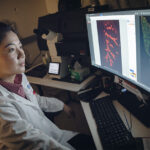Dysmotility may play a major role in respiratory symptoms

Clinicians whose patients exhibit respiratory symptoms frequently assume that gastroesophageal reflux disease (GERD) is responsible. However, esophageal and gastric dysmotility may be more significant factors in respiratory disease than GERD alone, according to a recent review by Rachel Rosen, MD, MPH, and Samuel Nurko, MD, MPH. The paper, published in Current Treatment Options in Pediatrics, was coauthored by Lusine Ambartsumyan, MD, of Seattle Children’s Hospital. The contribution of gastrointestinal motility to respiratory disease is usually overlooked, even though optimal patient care depends on understanding its role and providing appropriate treatment.
Aerodigestive disorders marked by dysmotility
A number of pediatric aerodigestive conditions are marked by dysmotility. For example, cricopharyngeal dysfunction occurs when the muscle at the top of the esophagus, known as the upper esophageal sphincter (UES), doesn’t relax to allow food to enter the esophagus or it relaxes in an uncoordinated manner. This can cause dysphagia, particularly in babies and young children.
In older children, the most common primary motility disorder of the esophagus is esophageal achalasia, which occurs due to a lack of peristalsis and abnormal relaxation of the lower esophageal sphincter (LES).
Motility testing is key
Both disorders can cause aspiration, choking, gagging, regurgitation, coughing, and recurrent respiratory infections — symptoms similar to those associated with GERD — and are frequently referred to the Aerodigestive Center. For this reason, integrating motility testing into aerodigestive care is key to forming an accurate diagnosis and providing effective treatment.
Recent advances in motility testing now allow clinicians to better understand the physiological processes involved in aerodigestive conditions. For example, high-resolution esophageal manometry, paired with impedance, is the gold standard test to diagnose esophageal dysfunction and esophageal stasis, the latter of which can be harmful to the lungs. “Diagnosing motility disorders is not just academic,” says Rachel Rosen, “We now have new motility mediations and endoscopic therapies to reduce stasis and hopefully improve respiratory outcomes.”
“Understanding the exact pathophysiology of the underlying symptoms is very important, as otherwise the wrong treatment will be provided,” says Nurko, director of Boston Children’s Motility and Functional Gastrointestinal Disorders Center. “It is too simple to think that all aerodigestive disorders are related to gastroesophageal reflux.”
Integrating motility testing into aerodigestive care
Rosen, Nurko, and Ambartsumyan recommend that gastrointestinal dysmotility should be included in the differential diagnosis of any patient who presents with chronic respiratory symptoms before attributing those symptoms to GERD. Their review also addresses secondary dysmotility disorders, such as esophageal atresia, tracheoesophageal fistula, as well as systemic scleroderma and post-lung transplant dysfunction. Respiratory symptoms in aerodigestive patients can also result from complications following fundoplication, a common but sometimes ineffective surgical treatment for GERD.
“Pediatricians, pulmonologists, and otolaryngologists used to send patients to see a gastroenterologist to rule out GERD,” says Rosen, director of Boston Children’s Aerodigestive Center. “We are hoping that soon, with increased education and research, clinicians will send patients to us to rule out motility disorders.”
Learn about the Aerodigestive Center.
Related Posts :
-

A unique marker for pericytes could help forge a new path for pulmonary hypertension care
Pulmonary arterial hypertension (PAH) is a rare condition that’s difficult to treat. The hallmarks of the disease — narrowing of ...
-

New research paves the way to a better understanding of telomeres
Much the way the caps on the ends of a shoelace prevent it from fraying, telomeres — regions of repetitive DNA ...
-

AI-designed proteins open doors to new immunotherapies
Artificial intelligence (AI) is increasingly helping drive advances in science and medicine — including cellular signaling. In a recent study, published ...
-

Advancing global health: Using AI to detect heart disease in children
In many low- and middle-income countries, pediatric cardiologists can’t help children with congenital heart conditions because of a critical ...





